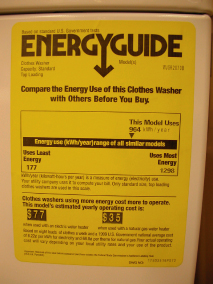High-efficiency clothes washers save energy in three important ways:
- More efficient motors than old machines
- Reduced hot water usage
- Reduced moisture content of clean clothes requiring less drying time
About 90% of the energy used by clothes washers is for heating the hot water used to wash the clothes. Only about 10 percent or less of the energy is used by the electric motor that runs the clothes washer. So, the best way to improve the efficiency of a clothes washer is to reduce the amount of water, particularly hot water, that is needed to wash the clothes.
The efficiency of a clothes washer is measured by a term called the energy factor. It is somewhat similar to the miles per gallon for a car, but in this case the measure is cubic feet of washing capacity per kilowatt-hour of electricity. The minimum allowed modified energy factor rating for standard capacity clothes washers is 1.04.
In many cases the energy savings from a high-efficiency clothes washer will be of higher value than the water and wastewater savings. The combination of all three makes this appliance an excellent choice if you are looking to purchase a new washer.
Some high-efficiency models are more expensive than standard models, but the difference in cost is typically paid off in water and energy savings in between 1 and 6 years depending on your location and the clothes washer you select.
Federal law requires that EnergyGuide labels be placed on all new clothes washers. These labels are bright yellow with black lettering. Look for the EPA’s ENERGY STAR label when purchasing a new clothes washer. This label indicates the machine is energy efficient.
High-efficiency (HE) clothes washers use significantly less water and energy compared to traditional washers. On average, Energy Star certified high-efficiency washers use about 30% less water and 20% less energy than regular washers.

Benefits and Costs
How much does a new high-efficiency clothes washer cost?
High-efficiency washers start at about $550 and go up from there to over $2,000. Good quality standard clothes washers typically sell for $550 – $800, so the high-efficiency machines are definitely more expensive.
However, if you are in the market for a clothes washer, consider that the water, wastewater, and energy savings from a high-efficiency machine may well make up the cost difference in just a few months or years. You can use the payback calculator below to determine if a high-efficiency machine makes sense for you and your family.
A higher efficiency machine will use less water and also energy when less water is heated for each warm water wash cycle. The higher the efficiency of the machine, the lower the Water Factor (measure of water used per cycle per cubic foot size of machine).
To sweeten the deal, some water and/or electric utilities now offer financial incentives for purchasing a high-efficiency washer. You can contact your water or electric utility for information about any incentive (or rebate) programs. If such a program exists in your area, the clothes washer salesperson is likely to know about it.
Clothes Washer Future Trends and Research
The future of clothes washers is now.
Over the last twenty years there have been remarkable changes in clothes washers and the clothes washer market. In 1995 water and energy efficient washing machines were few and far between. Today, almost every major manufacturer offers a water and energy efficient line of machines and many of these products are touted at the finest washing machines the company has ever made. Initially these machines were all front loading machines, but in the past two years a number of high efficiency top loading machines have been brought to market.
To top it off, the U.S. Department of Energy recently issued a new set of clothes washer efficiency standards that were hammered out in concert with manufacturers. These standards will gradually increase efficiency in washers over the coming years.
The consumer now has an excellent choice of high efficiency clothes washer products and prices. On average these machines are more expensive than traditional washers, but it is anticipated that the price will come down as time goes by. High efficiency washers will also enter the used appliance market in the coming years.
Manufacturers are actively researching new clothes washer designs, products, and technologies. The past five years have seen a substantial number of new products and innovative designs offered to the public.
Currently there are several research projects that are evaluating the effectiveness of high efficiency clothes washers as well as customer satisfaction with these products.
EBMUD (East Bay Municipal Utility District) has set a standard for clothes washing machines to have a water factor (WF) of 4.5 or less, which means a maximum average water use of 4.5 gallons per cubic foot of capacity.
For more information on clothes washer research you can visit the following web sites:
The amazing drop in home appliance energy use
Consortium for Energy Efficiency (CEE)
- What to Do if Your House Smells Like Gas but There’s No Leak - February 6, 2023
- Why Is There a Burning Smell Coming From My Vents? - August 16, 2022
- How to Remove the Musty Smell From Your Air Conditioner - August 16, 2022
